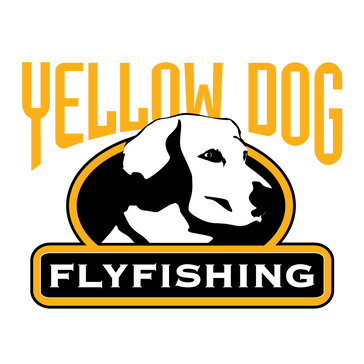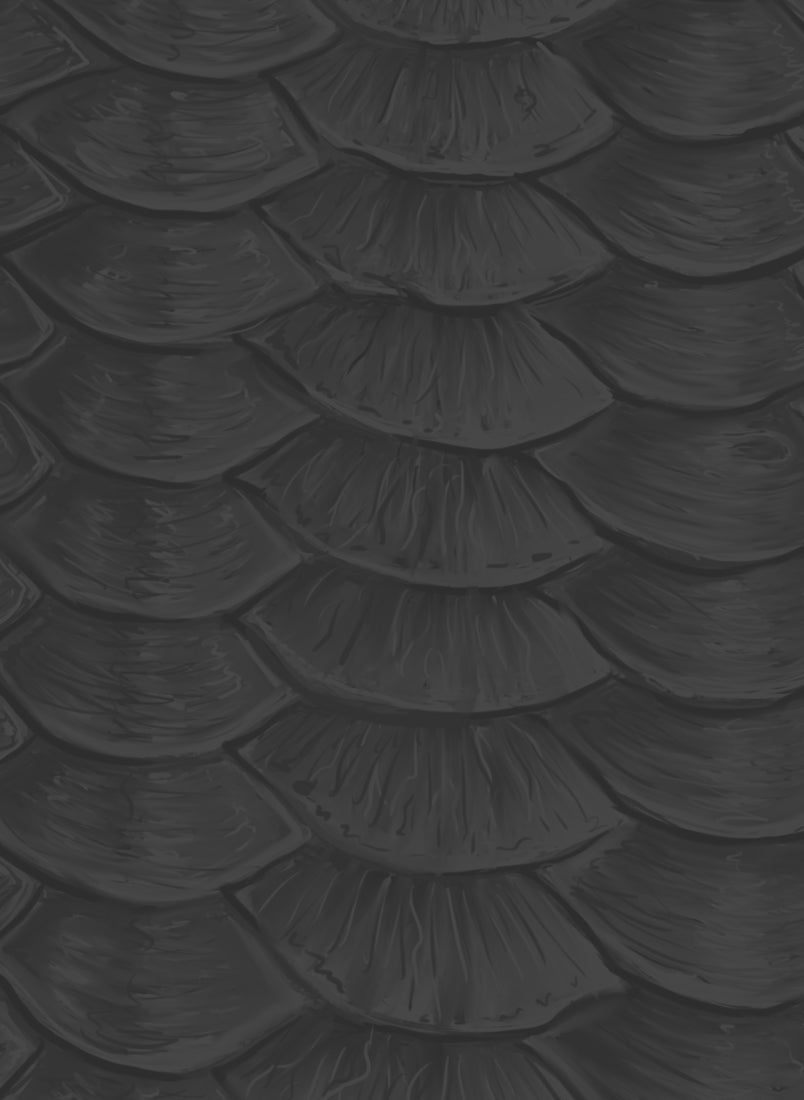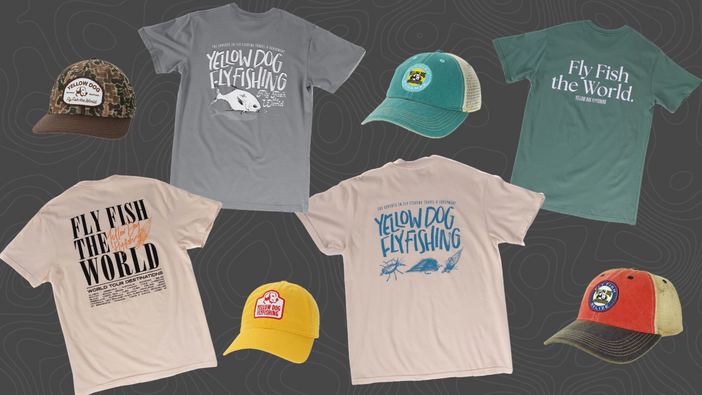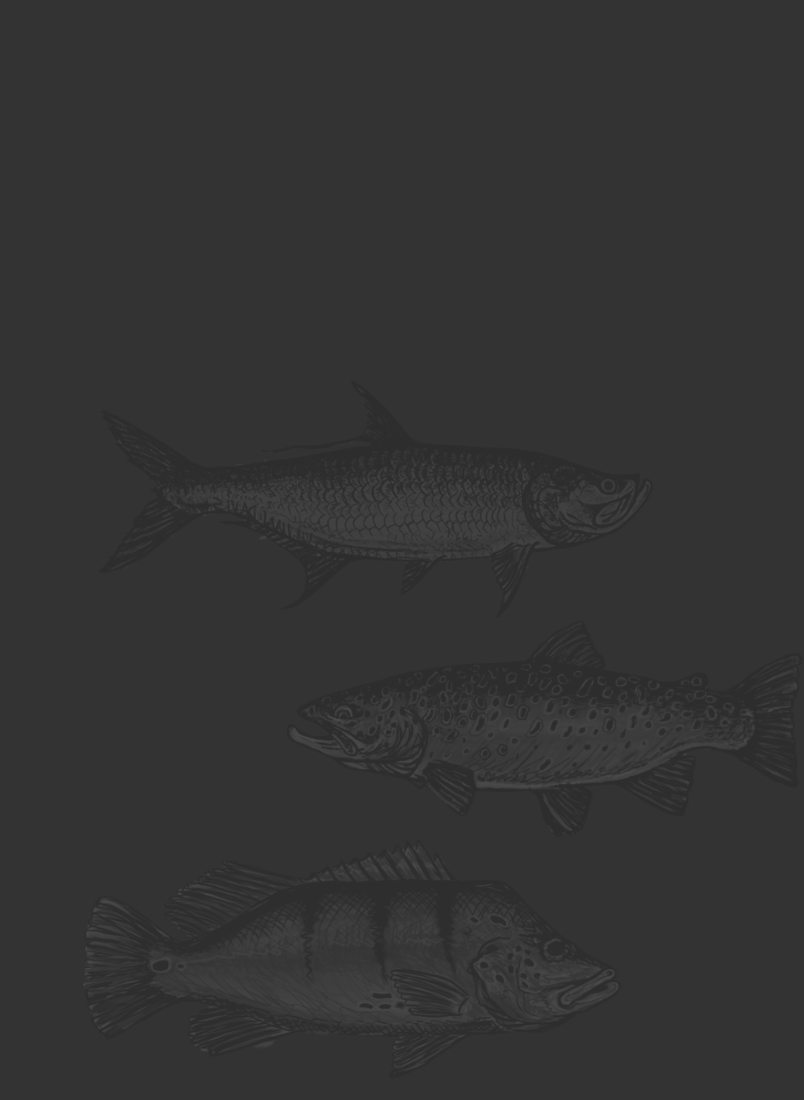Grand Bahama has long been one of Yellow Dog's favorite places to travel to for ease of access, the inviting culture, and the vastness of undisturbed saltwater flats. Long considered one of the best locations in the world for bonefish, Grand Bahama is also home to a larger proportion of big bonefish than other Bahamian islands.
Yellow Dog works with three lodge operations on Grand Bahama, each with its own appeal and personality. While many operations in The Bahamas are geared toward the committed angler traveling alone or with fishing friends, Grand Bahama is a family or companion-friendly island. Ample non-angling opportunities, mile after mile of jaw-dropping beaches, and some of the finest and most experienced saltwater fly fishing guides in The Bahamas make it a destination you cannot miss.
Geography of Grand Bahama
Only fifty-five miles from the coast of Florida, Grand Bahama is the northernmost island in The Bahamas and runs east to west for ninety miles. The island is divided along its center, referred to as West and East Grand Bahama. The second most populous city in The Bahamas, Freeport, sits on the island's western side, while most of the eastern portion is uninhabited. While most visitors assume Freeport is the capital, it is actually West End--the oldest settlement on the island and located at the western tip.
The north shore of Grand Bahama comprises many creeks, cays, and flats, creating hundreds of miles of fishable shoreline along white sandy beaches. The beaches here are easy to reach and generally promise an abundance of solitude amongst remarkable views of tropical seas.
Grand Bahama Highway is the primary road on the island, and stretches from Freeport along the south shore of Grand Bahama, eventually ending at the East End. The oceanside of the south shore offers an abundance of stark-white sand flats amongst dazzling turquoise water. Some of the most stunning flats reside on the south shore, and with close proximity to deeper water, these flats offer anglers access to some of Grand Bahama's largest bonefish.
The island's eastern end contains a series of "bights" or divisions through the island where saltwater runs freely with the tide. The resulting cays create a patchwork of creeks, flats, and estuaries where guides can access the optimal tide no matter the time of day. This area makes up what is known as "the horn" of the island, an apt name when studied from a map.
Fly Fishing Grand Bahama
Choosing a bonefish destination in The Bahamas can be a tough task, and depends on what the angler is looking to get out of the trip. Grand Bahama just about ticks every box in terms of offering top-class accommodations, non-angling opportunities, and excellent fishing.
One of the most attractive qualities of Grand Bahama is both an abundance of bonefish, but also more opportunities for big bonefish. Fish in the four to six-pound range are very common, and bonefish hitting the ten-pound mark are more common than in other fisheries. If you compare Grand Bahama to other popular bonefishing destinations such as Belize or Mexico, the fish tend to be larger--and sometimes less picky.
Grand Bahama is an excellent option for both skiff-based angling and wading. Since most of the island comprises pristine sand flats or corral bottoms, wading isn't a problem when searching for tailing fish in skinny water. In these situations, anglers should be prepared to utilize longer leaders, make delicate presentations, and make the first cast count.
When fishing the island's west side, guides can utilize both the flats of the north shore, around the West End, and the south shore depending on tidal conditions. Anglers can expect to fish over turtle grass, coral, and white sand, depending on the tide.
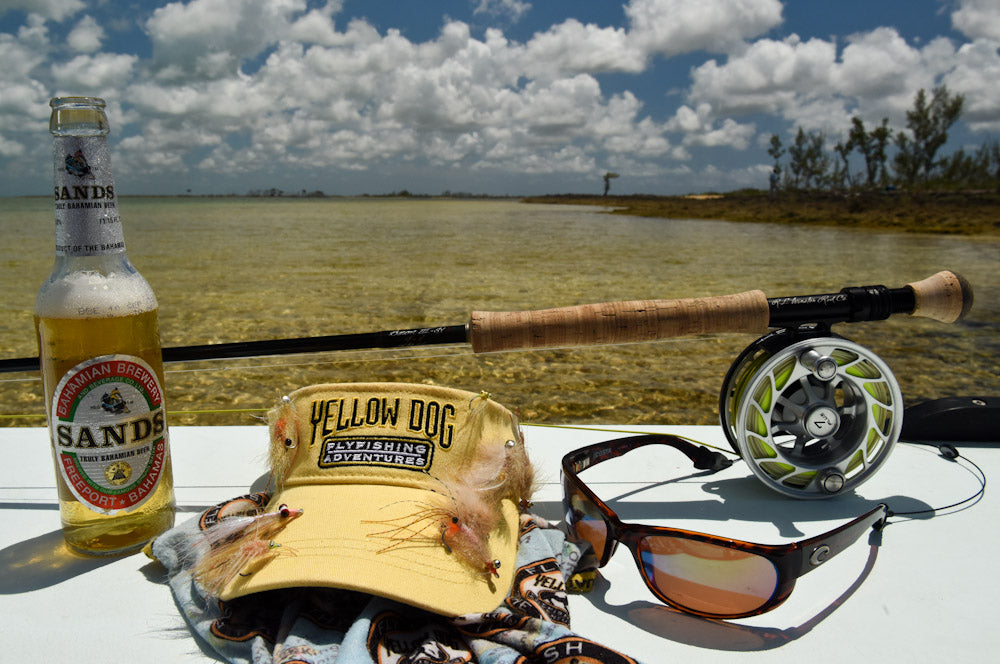
The western portion around Freeport is our favorite location on Grand Bahama for anglers traveling with family or perhaps looking to take advantage of the amenities within Freeport. H20 Bonefishing & Pelican Bay Resort, located right off the beach, strikes a perfect balance in top-shelf accommodations, an abundance of non-angling opportunities, and immediate access to the flats of Grand Bahama.
Heading eastward, North Riding Point Club is a thirty-minute drive down Grand Bahama Highway. The guides here utilize trailers to haul skiffs a short ride away to ensure anglers are always fishing optimal tides. The benefit of Grand Bahama's geography means traveling from one point to another is a short ride, and anglers can dedicate the bulk of their day to fishing. The lodge fishes both the north and south shores of the island, offering diversity in fishing habitat and scenery.
At the furthest point of Grand Bahama Highway, East End Lodge is perfectly positioned for fishing the horn of the island. The bights running through the end of this area grant anglers the best fishing schedule on offer at Grand Bahama. While most destination saltwater trips are highly impacted by moon phases, guides at East End Lodge can keep you fishing in the optimal zones. Furthermore, the bights of the east end allow guides to station anglers on the leeward side of the cays in heavy winds.
Given Grand Bahama's close proximity to deeper water, both larger bonefish and permit are around. If you are looking to combine stellar bonefishing with opportunities for permit during the warmer months, Grand Bahama should be near the top of the list. The permit on Grand Bahama might be fewer in numbers but are generally large fish--ranging from twenty to upwards of forty pounds. Along with the larger-than-average permit, anglers can also target barracuda, sharks, jacks, snapper, and several other species.
Opportunities for tarpon begin in the spring and can last through the summer months. While not a prolific tarpon fishery, both juvenile and large migratory fish can be found.
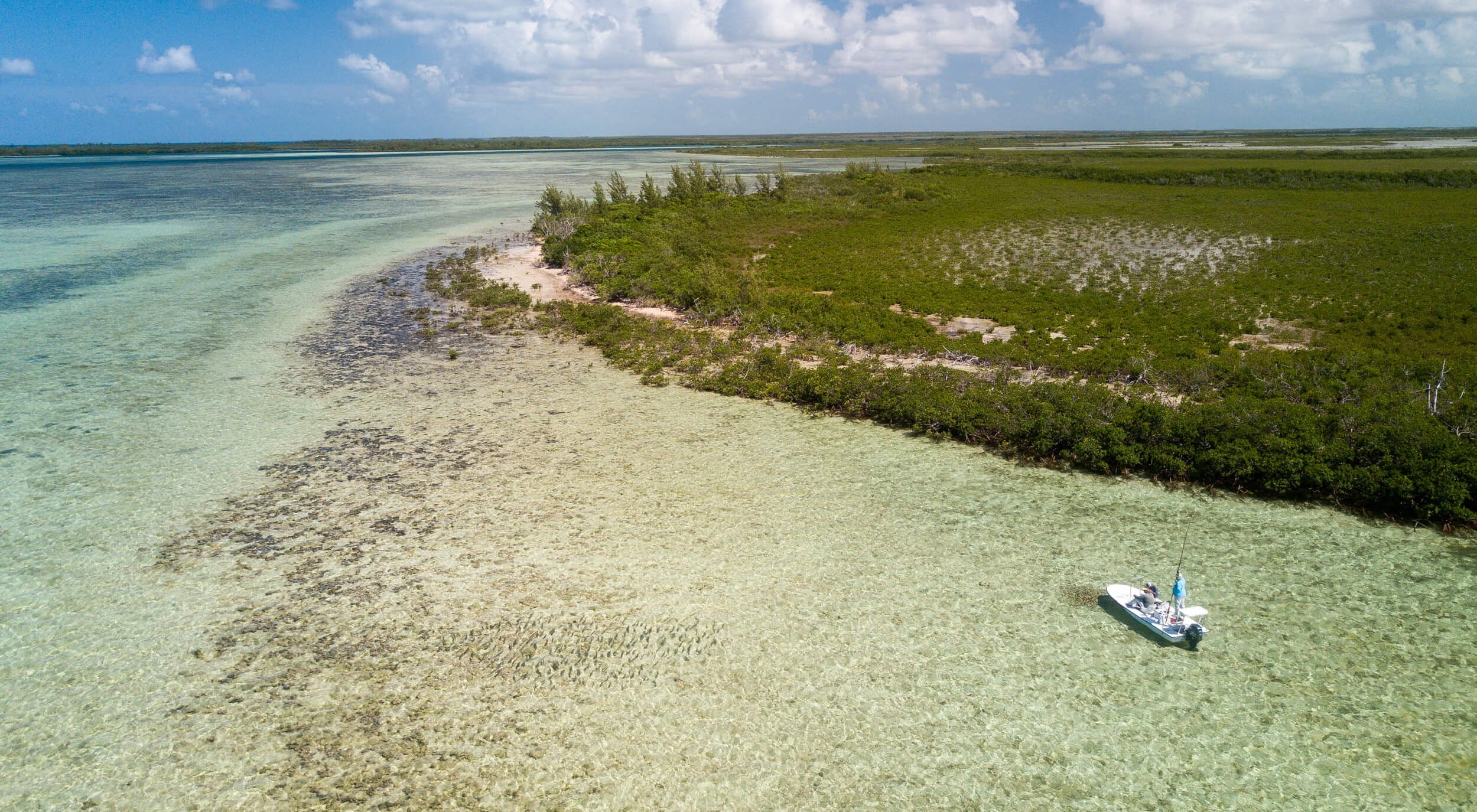
How to Get There
Grand Bahama is the easiest flats fishing destination to reach in the Bahamas, due to the numerous direct daily flights from Miami, West Palm Beach, Ft. Lauderdale, Atlanta, and several other U.S. cities to Freeport’s Grand Bahama International Airport (FPO). You can arrive and depart on any day of the week.
Gear and Flies for Grand Bahama
The most common setup for bonefishing is a 9-foot, 8-weight with a floating line. At times, during windy conditions, a 9-weight is useful, while a 7-weight would suffice on calmer days.
For permit, a 9-foot, 9-weight with floating line is ideal, while a 10-weight would provide a good balance for resident tarpon and the larger migratory fish. A floating and intermediate line is ideal for tarpon fishing.
Flies for Bonefish: Bonefish flies should primarily have bead-chain eyes, with a few heavier and unweighted flies available depending on water depth.
- Gotcha (4-8)
- Gotcha Legs (4-8)
- Crazy Charlie (4-8)
- Mantis Shrimp (4-6)
- Spawning Shrimp (4-6)
- Squimp (2-6)
- Tarpon Toad (1/0-1)
- Black Death (2/0-1)
- Clouser (2/0-1/0)
Flies for Permit: Crab and shrimp patterns in various sink rates are key, with small, medium, and heavy lead eyes. Some examples are:
- Strong-Arm Merkin (1-2)
- Raghead (2-6)
- Danger Muffin (2-4)
- Merkin (2-4)
For a in-depth look at all the gear and apparel you will need, read our Bahamas Recommended Gear Guide.
Why Grand Bahama?
Dorian: On September 1st, 2019, a category five hurricane, Dorian, landed on the island of Abaco and Grand Bahama. The hurricane was the strongest in recorded history in The Bahamas and decimated long-established homes, businesses, and the Bahamian landscape. Hundreds of lives were lost, and many residents lost everything they own. East End Lodge, for example, was wiped from the map and was recently rebuilt. The combined damage and loss of revenue is well into the billions and means your trip will offer fantastic fishing and benefit the people of Grand Bahama on their path toward recovery.
Tidal Advantages: Due to Grand Bahama's unique topography, proximity to deep water, and bights on the east end, anglers have more flexibility with the tides. Instead of planning an entire destination trip around the moon phases, anglers can travel to Grand Bahama and expect to find fish when fishing with one of our lodge partners.
Big Bonefish/Permit: The abundance of deeper and cooler water around Grand Bahama means bonefish are generally larger, in addition to offering some of the best opportunities for permit in The Bahamas. Grand Bahama should be at the top of any angler's list looking to target trophy bonefish, both from a skiff or wading.
Non-Angling Options: Grand Bahama's western half offers fantastic options for anglers traveling with family, friends, or on a couple's trip. Whether looking to enjoy the town of Freeport, a spa treatment, a round of golf, or lounge along the remarkable beaches, there are plenty of options that other Bahamian islands cannot offer.
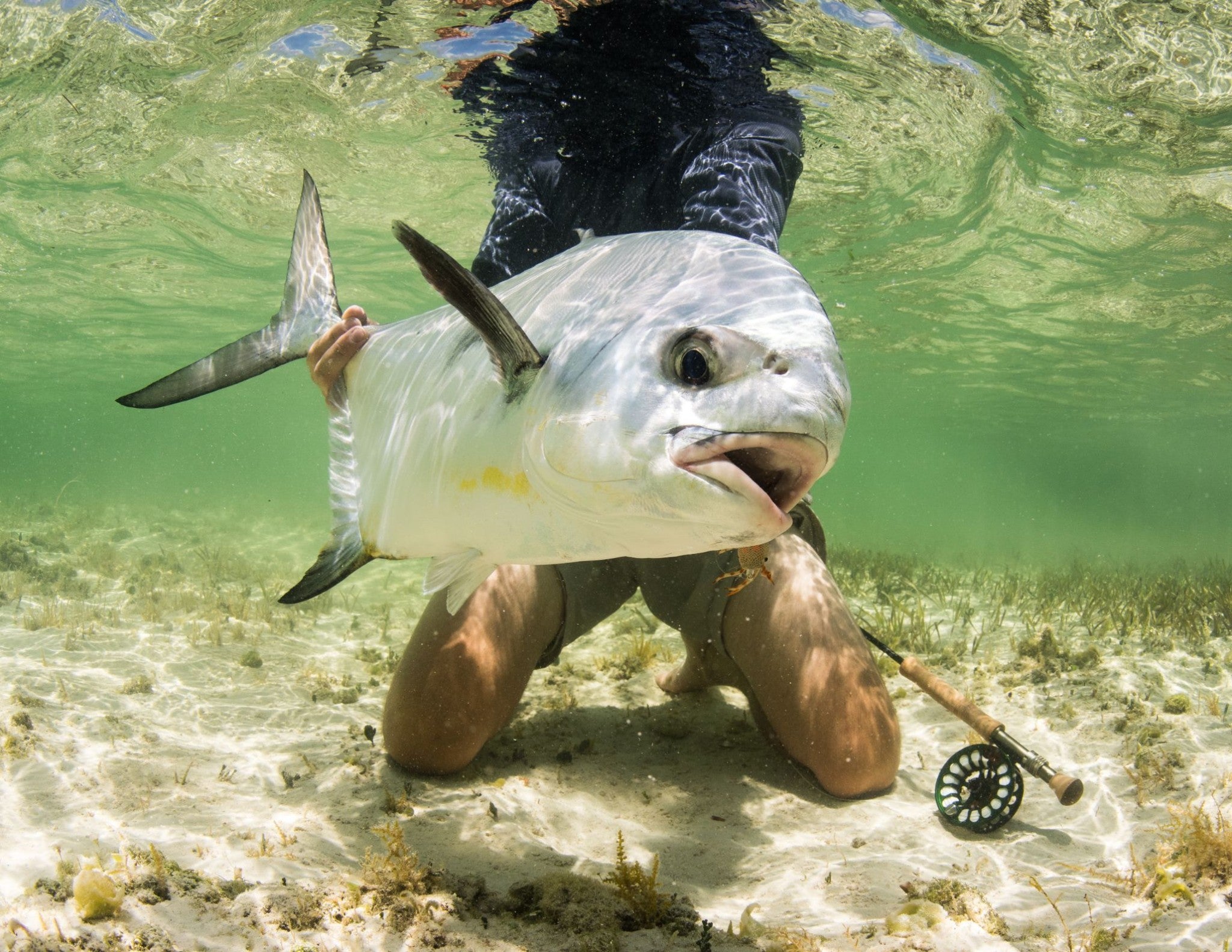
Whether you're booking your first saltwater destination trip or are an experienced traveler, Grand Bahama is an excellent choice. We have developed relationships with the guides, lodge owners, and lodge staff of Grand Bahama for decades and rank it as one of our favorite locations for chasing the grey ghost and for a wonderful off-the-water experience. Yellow Dog looks forward to planning your next destination trip to Grand Bahama or one of the hundreds of lodges we partner with all over the globe.
+ Listen to this WAYPOINTS Podcast: Rob Neher – Fly Fishing the Flats of Grand Bahama
Related Articles:
- A Guide to Fly Fishing Andros, Bahamas
- A Guide to Fly Fishing Abaco, Bahamas
- 5 Reasons to Book a Bahamas Fly Fishing Trip
- Targeting Trophy Bonefish in The Bahamas During the Winter Season
- Saltwater Fly Fishing's Best Mid-Summer Destinations
- The Ultimate Guide to Belize Fly Fishing
- Best Tarpon Fly Fishing Destinations
